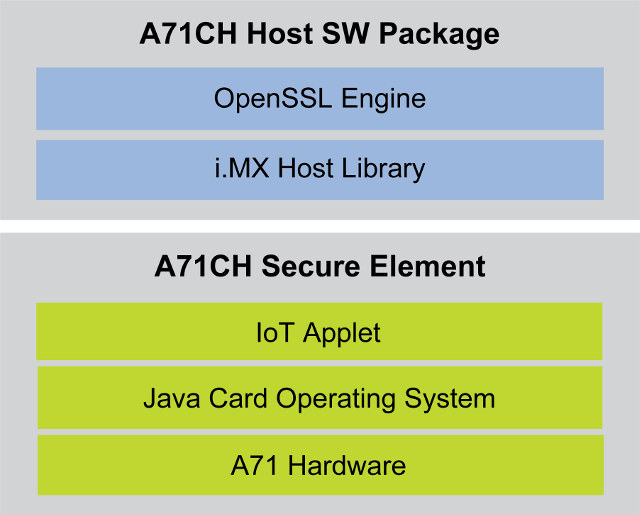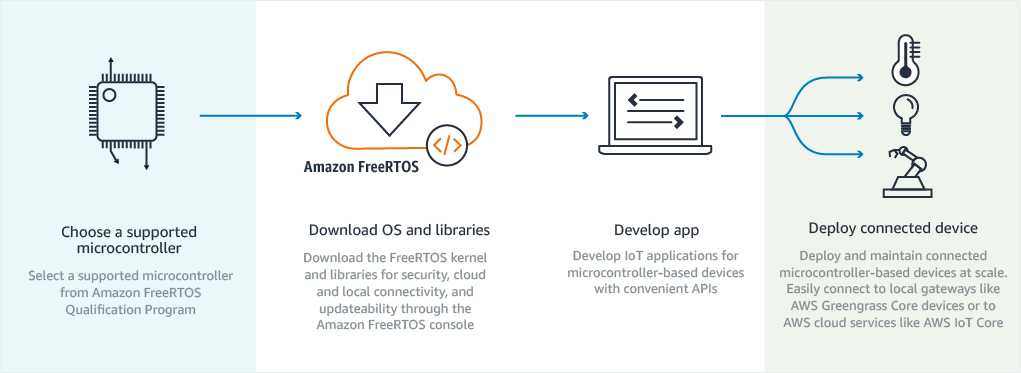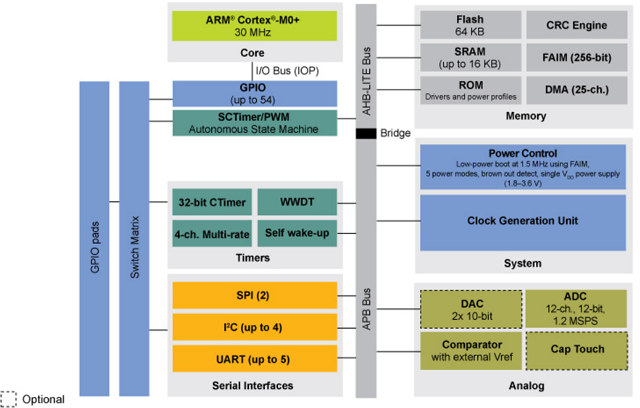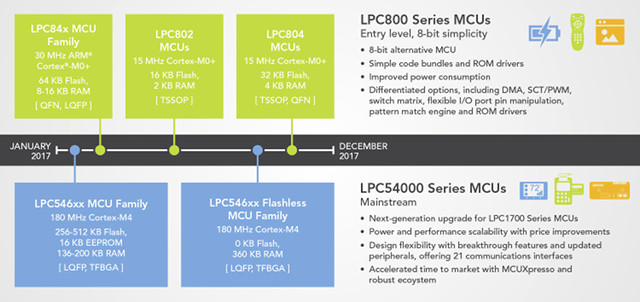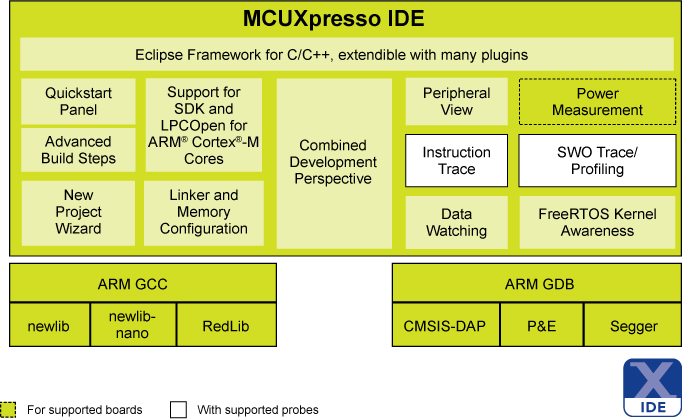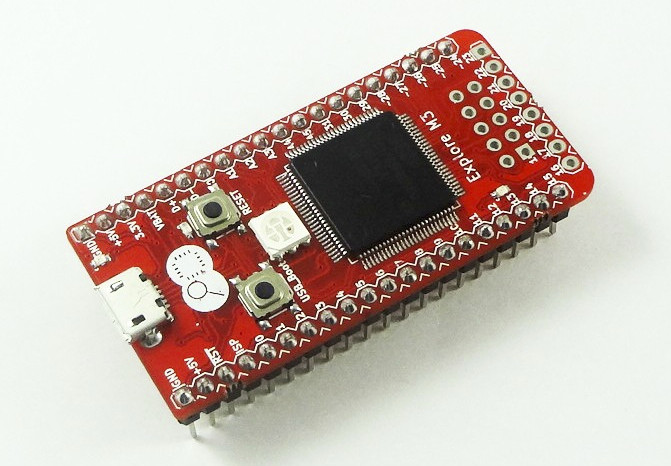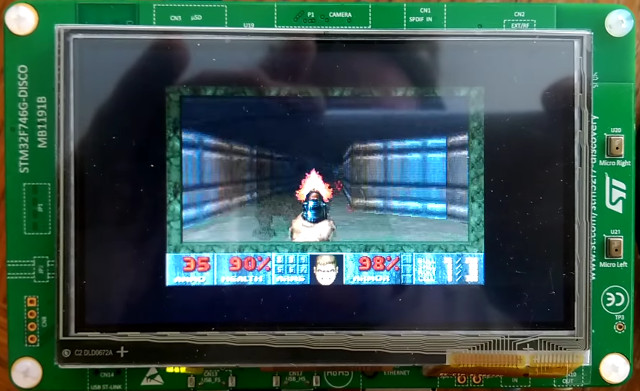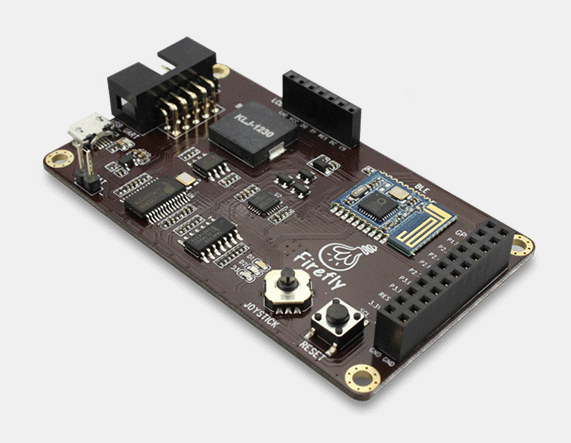The industry clearly has an issue at hand with the security of the Internet of Things, and the problem is complex as some devices are easily accessible due to bad configuration (e.g. default username/password), while others may have security flaws at various levels of the software stack from the low level bootloaders to the operating systems, and applications. Nowadays, devices also need to be upgradeable, and communicate with the cloud, and that introduces other attack vectors in case malignant firmware is installed instead, or a man-in-the-middle attack occurs. While some people may claim security can be achieved by software only, we are seeing security evolving towards combined software and hardware solutions, for example with Arm Trustzone built into SoCs, but some companies are also introducing Secure Element chip, which Samsung has already done and integrated into their Artik modules to secure data from the hardware to the cloud. NXP has […]
Amazon FreeRTOS Released for NXP, Texas Instruments, STMicro, and (soon) Microchip Microcontrollers
FreeRTOS is an open source real-time operating system for microcontrollers released under an MIT license, and when it comes to adoption in embedded systems it’s right there near the top with embedded Linux according to Aspencore 2017 embedded markets study. For example, some Espressif SDKs for ESP8266 or ESP32 are based on FreeRTOS, and so is Mediatek LinkIt Development Platform for RTOS. The recently announced Amazon FreeRTOS (a:FreeRTOS) leverages the open source operating systems, and extends it with with libraries that enable local and AWS cloud connectivity, security, and soon over-the-air updates. a:FreeRTOS is free of charge, open source, and available today. In order to get started, you’ll have a choice of 4 hardware platforms: STMicro STM32L4 Discovery Kit IoT Node (B-L475E-IOT01A) powered by STM32L475 ARM Cortex-M4 MCU with 802.11 b/g/n WiFi, Bluetooth 4.1 LE, RF (868 / 915 MHz), and NFC connectivity, plenty of sensors NXP LPC54018 IoT module (OM40007) […]
NXP Unveils LPC84x ARM Cortex M0+ MCU Family, and LPCXpresso845-MAX Evaluation Board
NXP Semiconductors has expanded LPC800 series MCUs with the new LPC84x family of 32-bit ARM Cortex-M0+ microcontroller said to offer 10 times the performance, three times more power saving savings, and 50 percent smaller code-size than 8- or 16-bit microcontrollers. Key features of LPC84x MCU family (LPC844 / LPC845): MCU Core – ARM Cortex-M0+ core @ 30 MHz with advanced power optimization RAM – 16 kB RAM (Logic for Bit banding across all of SRAM) Storage – 64 kB Flash, small 64-byte page size suitable for EEPROM emulation Peripherals Timers – 32-bit CTimer, WWDT, 4-channel multi-rate, SCTimer/PWM Serial Interfaces – Up to 4x I2C, 2x SPI, up to 5x UART Analog Interfaces – 12 ch, 12-bit ADC up to 1.2 Msps; 2x 10-bit DAC; comparator with external Vreg; 9-channel capacitive touch interface working in sleep and deep sleep modes Up to 54 GPIOs 25-ch DMA offloads core Power Control Five […]
NXP LPC Microcontrollers Roadmap for 2017 – LPC800 and LPC54000 Series
With the acquisition of Freescale, NXP now has both Kinetis and LPC ARM Cortex M micro-controller families. The company has kept selling both so far, but it’s unclear whether they’ll keep developing new Kinetis MCU family in the future. There’s no such doubt about LPC family with the company having published a 2017 roadmap for ARM Cortex M0+ based LPC 800 series, and ARM Cortex M4 based LPC54000 series. LPC800 series MCUs are promoted as 8-bit MCU alternatives, and three new models are expected next year: LPC84x ARM Cortex M0+ @ 30 MHz with 64KB flash, 8 to 16KB RAM available in QFN and LQFP packages. LPC802 ARM Cortex M0+ @ 15 MHz with 16KB flash, 2KB RAM available in TSSOP packages LPC804 ARM Cortex M0+ @ 15 MHz with 32KB flash, 4KB RAM available in QFN or TSSOP packages There will be new models of the more powerful LPC54000 […]
NXP Unveils MCUXpresso Development Tools for LPC and Kinetis Microcontrollers
After NXP bought Freescale, you had development tools for Freescale Kinetis MCUs such as Design Studio or Kenetis SDK, and others such as LPCXpresso for NXP LPC microcontrollers. The company has worked to unifying software and tools support between its ARM Cortex-M MCU families, and has now announced MCUXPresso software and tools for both NXP Kinetis and LPC MCUs. MCUXpresso unifies thousands of Kinetis and LPC microcontrollers under a set of compatible tools including MCUXpresso SDK – Open-source software MISRA-compliant development kit (SDK) with peripherals drivers, wireless & wired connectivity stacks, middleware, real-time OS, getting started guides, API documentation, and application examples. MCUXpresso IDE – Integrated development environment (IDE) for editing, compiling and debugging. It also integrates MCU-specific debugging views, code trace and profiling, multicore debugging, etc… Both free and professional edition of the IDE will be available, and LPCXpressor and previously Freescale Freedom & Tower platforms will be supported. […]
Explore M3 Board based on NXP LPC1768 Cortex M3 MCU Comes with Lots of Tutorials (Crowdfunding)
Explore M3 is an ARM Cortex M3 development board powered by a micro USB port, with plenty of I/Os, Arduino compatible, and the developers have also written many tutorials to help people getting started as fast and easily as possible. A starter kit with cables and sensors is also available with the board. Specifications: MCU – NXP LPC1768 ARM Cortex M3 @ up to 100MHz with 512KB flash, 64KB RAM, USB – 1x micro USB 2.0 OTG port for programming and power Expansion Headers – 2x 20-pin male headers + 8-pin unpopulated header with 38x GPIOs, 4x UARTs, 2x CAN, 2x SPI, 2x I2C, 6x PWM, 5x ADC, 1x DAC, 2x interrupt pins, I2S audio, and power signal Debugging – JTAG/SWD Debug connector Misc – USB boot and reset buttons Dimensions – 55mm x 25mm The hardware is somewhat similar to mbed LPC1768 board but with a few more I/Os. […]
Frosted OS is an Open Source POSIX Operating System for Cortex-M Micro-controllers
Frosted, which stands for “Free Operating Systems for Tiny Embedded Devices”, is an OS with a POSIX-compliant system call API, borrowing the Linux kernel kconfig for configuration, and currently supporting ARM Cortex M0,M3,M4, and M7 MCU including Texas Instruments Stellaris LM3S, STMicro STM32F4/F7, and NXP LPC17XX micro-controllers. The developers are focusing on IoT applications, as well as porting retro-games such as Doom. The kernel relies on libopencm3 for hardware abstraction, and the operating system can be built with GCC ARM for Frosted using the source code released under a GNU GPLv2 license. The Wiki explains how to build and run the OS on either Qemu (in a Linux computer) used LM3S target, or an STM32F4 Cortex -M4 or STM32F7 Cortex-M7 board. The team also uploaded showing a video of Doom (fdoom) running on STM32F7 board, and possibly adapted from stm32doom port. If you are interested in joining the project you can […]
Firefly introduces FireBLE Bluetooth Low Energy Board
So just as today I wrote about XBAND BLE Sensor board, the makers of Firefly-RK3288 also announced their own Bluetooth Low Energy board aptly named FireBLE, and also integrating a 6-axis gyroscope and accelerometer, but instead of being based on Nordic or Cypress, the company went with an NXP BLE chip. FireBLE board specifications: SoC – NXP QN9021 ARM Cortex M0 MCU @ 32MHz with 94KB ROM (protocol stack), 64 KB SRAM, 128KB flash Bluetooth – BT 4.0 single mode. Central and peripheral mode with up to 8 simultaneous connections. Sensors MPU-6050 3-axis gyroscope and 3-axis accelerometer with an on-board Digital Motion Processor (DMP) capable of processing 9-axis motion fusion algorithms. Battery and temperature sensor USB – micro USB port for power and programming Expansion – 3 expansion headers with access to SPI, UART, I2C, GPIO, and PWM, as well as OLED display interface. Debugging – JTAG, support SWD online […]


